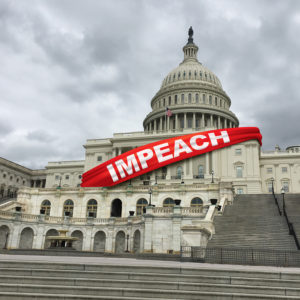WASHINGTON ― Inside the Beltway surrounding the American capital, a single topic these days excites the elitists, politicians, lobbyists, bureaucrats, journalists and intellectuals who compete to run the country.
They’re obsessed by one of the most divisive gang fights in American political history since the Civil War of the 1860s. The outcome of the unremitting drive to get Donald Trump out of the White House versus the impassioned defense put up by loyalists surrounding him may set the tone of U.S. policy at home and abroad for decades.
Tune in on any American news channel these days, and it’s difficult to hear much else beside the views of experts and politicos as well as journalists pursuing them for tidbits of news or gossip. In all the yakking, the impression is that nothing much matters here beyond Trump’s attempt at tying military aid to Ukraine to the Ukrainian president’s willingness to dig up dirt on the son of Joe Biden, the former vice president and contender for the Democratic nomination for president in 2020.
The Democrats have wanted to impeach Trump from the time he was inaugurated nearly three years ago while the Republicans are mustering any argument to rescue him. The battle is tarring Biden as well as Trump since Biden’s son was collecting tens of thousands of dollars a month from a Ukrainian firm mired in the same massive corruption that his father claimed to have been fighting.
The furor makes for great theater while networks, anchors and correspondents line up on one side or the other, all the while maintaining guises of objectivity and fair play. If nothing else, we’re treated to moments of tension that have nothing to do with improving people’s lives but are mesmerizing enough to draw viewers from prime-time drama.
The whole show pretty well obliterates any chance of the Congress doing anything else at least until the Democrat-dominated House approves articles of impeachment against Trump. Then the story moves over to the Republican-dominated Senate, which won’t approve Trump’s impeachment unless enough Republican senators cross party lines to find him guilty. That’s still difficult to imagine, but Trump’s mistakes in his dealings on Ukraine and other issues are catching up with him.
All of which leaves U.S. foreign policy in a most delicate if not ambiguous position. We do know from all the talking that Trump was taken in by Russia’s Vladimir Putin and would rather not believe the Russians were trying mightily to influence the 2016 presidential election. Whether the Russians had that much influence is not clear, but for sure they were relieved to find Trump victorious over the strong-willed Hillary Clinton, who had shown her toughness as Barack Obama’s secretary of state.
We also know that when it comes to Korea, Trump is a menace. That’s obvious from his insistence on sticking to a ridiculous bargaining position on the billions that he wants South Korea to pay for U.S. bases and forces in South Korea, from his cancellation of joint military exercises between U.S. and South Korean troops and from his professed “love” for Kim Jong-un. Like Putin, Kim has thoroughly conned Trump, who used to criticize his predecessors in the White House on the ease of coming up with a deal on North Korea’s nukes and missiles.
In deliberations on Trump’s impeachment, Korea is a marginal matter, to be mentioned only in passing. In a time of political crisis in Washington, Korea is easily forgotten, sidelined, left up to the State Department.
The furor does, however, put pro-Northers, a diverse band including many Korean Americans, in a difficult position. Many fancy themselves “progressives,” opposed to the conservatism of Trump and his cohorts, but they dare not be too critical for one basic reason. He’s the one who’s befriended Kim Jong-un and is most likely to yield to Kim’s demands for a peace agreement and end to sanctions if he ever gets a chance.
South Koreans hardly know what to make of the sound and fury reverberating around the U.S. Capitol. President Moon Jae-in has to worry about what might happen to Trump, with whom he shares the same desire for reconciliation with the North.
If Trump were actually forced out, Vice President Mike Pence would take over. He was at the PyeongChang Winter Olympics last year when the North made its first move toward dialogue with Moon and then Trump, but he’s remained carefully quiet. As for all the Democrats running for their party’s nomination for president, their views about foreign policy, particularly toward North Korea, are little known.
None of which should detract from the fun of watching another episode of Trump’s impeachment while forgetting about the greater issues of war and peace from the Middle East to Northeast Asia.

